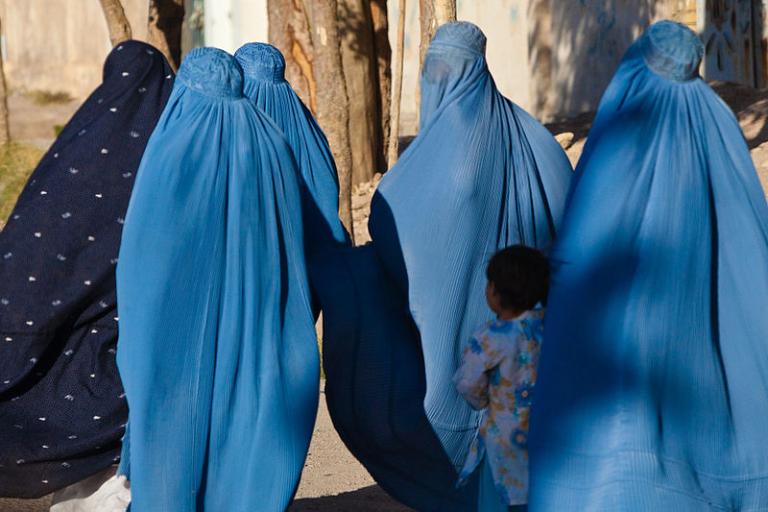
I’ve been following the reports on Afghanistan: the collapse of the Afghan army as the Taliban gains more and more territory (and more and more American military equipment), the desperate attempts of the American government to evacuate American personnel and Afghan employees and dependents before Kabul itself falls, the apparent surprise of the Biden administration as to how quickly the country is falling, their calls for the Taliban to “be nice” to give the Americans enough time to leave, with a feeble threat that their international recognition is at stake, etc.
I wonder what a 1975 twitter would have looked like, whether it was simply taken as a given that South Vietnam would fall, with the more leftist elements of the US considering that to be a positive development, or whether the politicians of the time insisted that the South Vietnamese government would be able to hold off Ho Chi Minh even without US manpower or materiel, or even that the North Vietnamese government would peacefully stay within their borders.
And, honestly, in 2001, nearly 20 years ago, I believed — and, yes, I’ll say I believed this alongside nearly all Americans — that Afghanis, men and women both, were just waiting for liberation from the Taliban and would thereupon, with the necessary rebuilding assistance, adapt to Western ways. It sound insane to my ears now, but, as someone just today on twitter pointed out, we were all seeing pictures — if not on twitter, then in the news — of pre-Soviet-Invasion Kabul, with fashionable young women around town, no different than similar photos of pre-Revolution Iran.
Here’s one example:
https://twitter.com/EricRWeinstein/status/1426592799441383435
Yet another twitter account today shared the missing context to these images: they were of the elite, who had adopted Western ways. Even in Kabul, most women wore burqas.
This individual goes on to say: “Most of these upper class, affluent people migrated out of Afghanistan from 1980s onwards because they could afford to leave a war torn country. You will find most of them settled down in western nations today where they have become even more westernized.”
In the meantime, two books shaped my perspective on Afghanistan.
The first I blogged about way back in 2015: In the Land of Blue Burqas, by Kate McCord. This was a memoir by a Christian woman who went to the country to do humanitarian work. She learned the local language and interacted directly with village women, and one passage that served as a radical undoing of my expectations was her description of a conversation with her (female) language tutor, as she wanted to share with them the message of “God loves you.” Mind you, she was not trying to convert them to Christianity in any way, but share this simple message of hope and encouragement — and her tutor said, “God is not love; God is kind.” This expression was, she says, a common one, but does not mean what Americans would think it might, an expression that God is a generous bestower of good gifts. She doesn’t cite precisely what this means to Afghans, but from the contexts she gives, it’s the equivalent of “the Lord giveth and the Lord taketh away; blessed be the name of the Lord.” And she relates further anecdotes in which the experience people have of God is that of a harsh taskmaster who measures deeds and punishes those who don’t measure up, those who haven’t fasted properly, for example.
Now, is it true, in general, that Muslims believe that God is in his essence a being who judges and punishes, rather than a being who loves and cares? I suspect that Westernized Muslims believe in “God is love”; that is, that it’s more of a cultural difference than one of religion. But it makes it clear that the cultural norms of the people of Afghanistan are radically different than those of Americans.
Second, The WEIRDest People in the World, by Joseph Henrich. I blogged about this over at Forbes, tying it in to retirement, of course, but the fundamental premise of the book is that the West (that is, Christian Europe, most specifically Western Christianity, and its descendants in Anglo-America) diverged from the rest of the world in terms of its culture and psychology in the Middle Ages when Popes and Councils decreed that one may not marry cousins, then widened the definition of a “cousin” to include second, third, even sixth cousins, and, although that prohibition was relaxed over time, it caused a chain of events, as Europeans relied on their communities rather than building up family “dynasties”: guilds, universities, elected town mayors, other community groups, and more all developed, as well as a psychology that is still with us today, in which we believe that one ought to do what’s right in an absolute sense, rather than what benefits one’s tribe or family, for example.
And it was reading this book, about a year ago, that crystallized my thoughts on Afghanistan — that it was foolish of us to have believed that the Afghan people would have acted as we would have wanted them to, in every respect from the corruption in our nation-building efforts to the apparent indifference of the Afghan army to fighting the Taliban, to their willingness to fight for the well-being of their daughters.
In fact, a year and a half ago, in March of 2020, I wrote that “I fully expect that we will at some point be helicoptering people out in a replay of 1975 Vietnam,” but I didn’t have any confidence as to why, listing “cultural differences” as only one possible explanation, and considered other explanations, including an unwillingness to fight against other Afghanis, or that those who might have been fighting had fled for Europe, or that there was simply a dearth of men who were both willing to and capable of fighting.
Lastly, some miscellaneous links:
Biden, during the campaign in 2020, stating that the US had no particular obligation to ensure the well-being of Afghanis just because we had been occupiers, and that the only consideration for any such intervention should be American national interest. (We’ll see if that holds up the next time there’s an outrage somewhere else.)
On July 8th, “And the likelihood there’s going to be one unified government in Afghanistan controlling the whole country is highly unlikely. . . . The Taliban is not the south — the North Vietnamese army. They’re not — they’re not remotely comparable in terms of capability. There’s going to be no circumstance where you see people being lifted off the roof of a embassy in the — of the United States from Afghanistan. It is not at all comparable. . . . The likelihood there’s going to be the Taliban overrunning everything and owning the whole country is highly unlikely.”
Slate, August 11th: “When the Taliban’s assaults first began in late June, U.S. intelligence analysts worried that the Taliban might take over in six to 12 months; now they’re saying it could happen in 90 days. That estimate too may prove overly optimistic.”
Today, CNN: “A diplomatic source told CNN that one intelligence assessment indicated that Kabul could be isolated by the Taliban within the week, possibly within the next 72 hours.”
On twitter:
https://twitter.com/MrMaitra/status/1425994490834268164
Also:
https://twitter.com/billroggio/status/1425955000262479873
More commentary here:
No one I talked to in Kabul believes the Americans can be so incompetent. They think it is all deliberation and dissimulation. Can you blame them? Incompetence at this level has indeed never been witnessed
— Bruno Maçães (@MacaesBruno) August 14, 2021
So what’s it all add up to?
That we are leaving is inevitable.
That we are doing so in a catastrophic way, is not. Whether this is due to pure organizational incompetence or to a fundamental delusion on the part of the Biden administration that the Taliban would “play by the rules,” would want to “be a part of the international community,” etc., so they had plenty of time, is not so clear to me.












